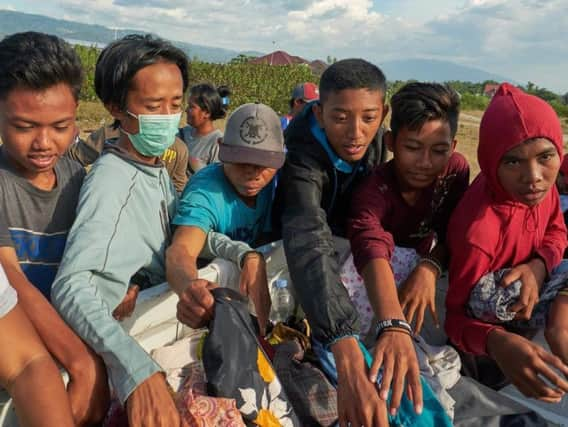Food and clean water are still urgently needed following Indonesia tsunami


Thousands of families are in desperate need of such supplies, as well as tents and tarpaulins to make emergency shelters.
DEC brings together a unique alliance of the UK’s leading aid charities and broadcasters to maximise fundraising and quickly deliver effective emergency relief.
Member charities, including British Red Cross and Christian Aid, have been assisting on ground with the delivery of supplies and providing health and sanitation services since the disaster.
However, as the local rainy season approaches, there is a pressing need to help those who are vulnerable, such as the elderly, children, people with disabilities, and pregnant women.
Landslides, debris, and a shortage of fuel and electricity have hampered emergency relief effort.
The full impact of the devastating earthquake and tsunami which hit the Indonesian island of Sulawesi is only now emerging.
It has been confirmed that 1.5 million people have been affected by the disaster, and 200,000 people are in need of urgent humanitarian assistance, about a quarter of whom are children.
More than 68,000 homes have reportedly been damaged, a figure which may rise as more assessments are undertaken.
To date, there are 79,000 people living in displacement sites in the tsunami-hit city of Palu with as many as 1,000 villages believed to have been destroyed or severely damaged.
Survivors also need protection and psychosocial support to help them cope with the trauma they have experienced.
In addition to losing their homes and a means to earn an income, many survivors have lost family members and friends.
Children have been separated from their families and there have been reports of children turning up alone at hospitals.
Food: People have now gone several days without eating, so ready-to-eat rations and food are expected to be an urgent humanitarian need in the coming days.
Clean water, sanitation and hygiene: Drinking water is in very short supply, as water sources have become contaminated and water pipes have been damaged.
Clean drinking water and basic sanitation and hygiene support are urgently needed to prevent risk of water-borne diseases and other health concerns.
Health care: Hundreds of people have been injured. Some hospitals have been destroyed, while those that continue to function are overwhelmed.
The risk of disease outbreaks is high because water and waste systems are not functioning. Emergency medical care, medicines, medical supplies and supply chain management are priorities.
Shelter: Some 68,000 houses have reportedly been damaged. Many homes were submerged underground as the earthquake caused the soil to liquify.
People are staying in makeshift shelters or in the open due to fear of further damage from aftershocks or more earthquakes.
Tents, tarpaulins, mats and blankets for those staying outside their home are urgently needed.